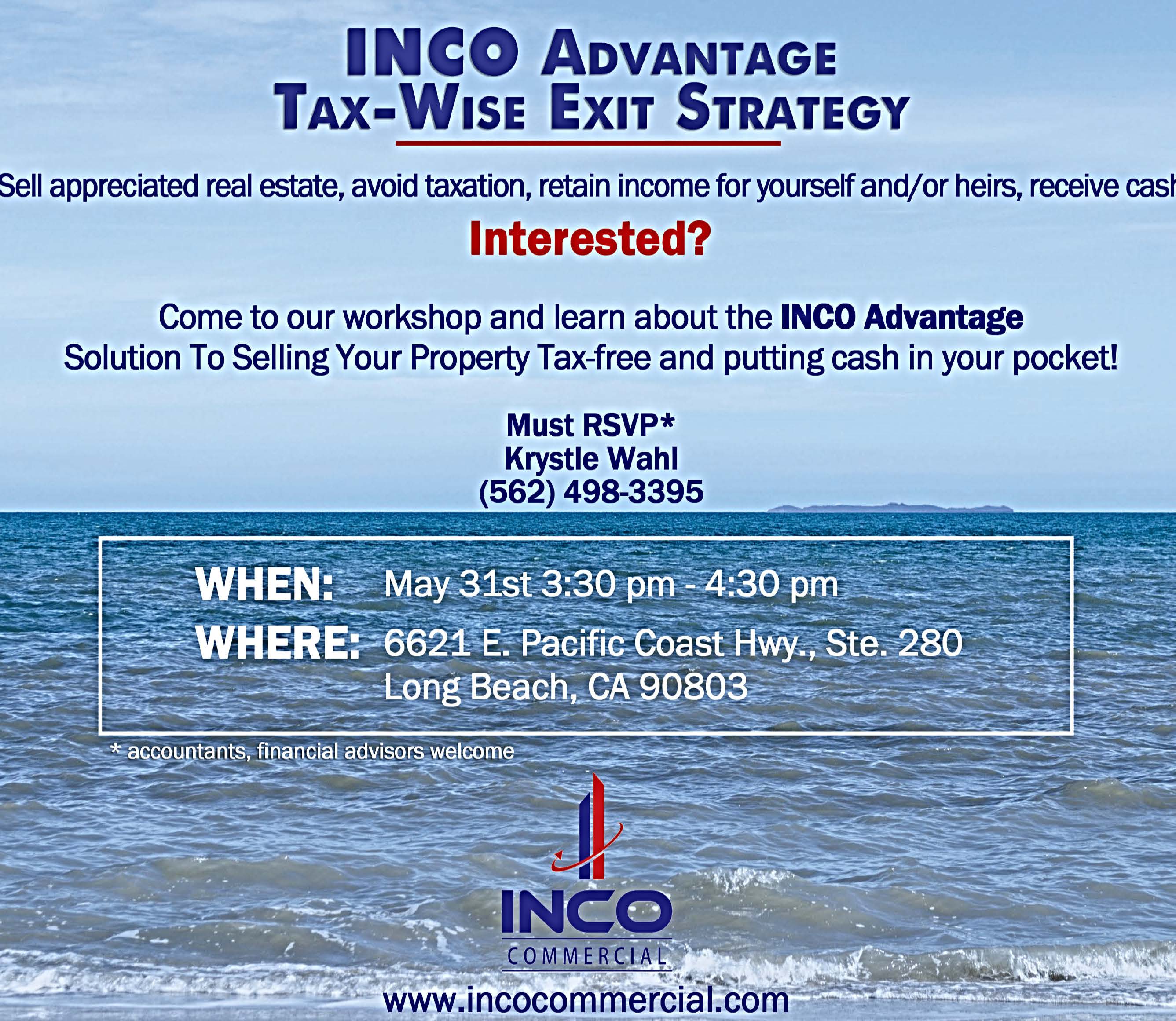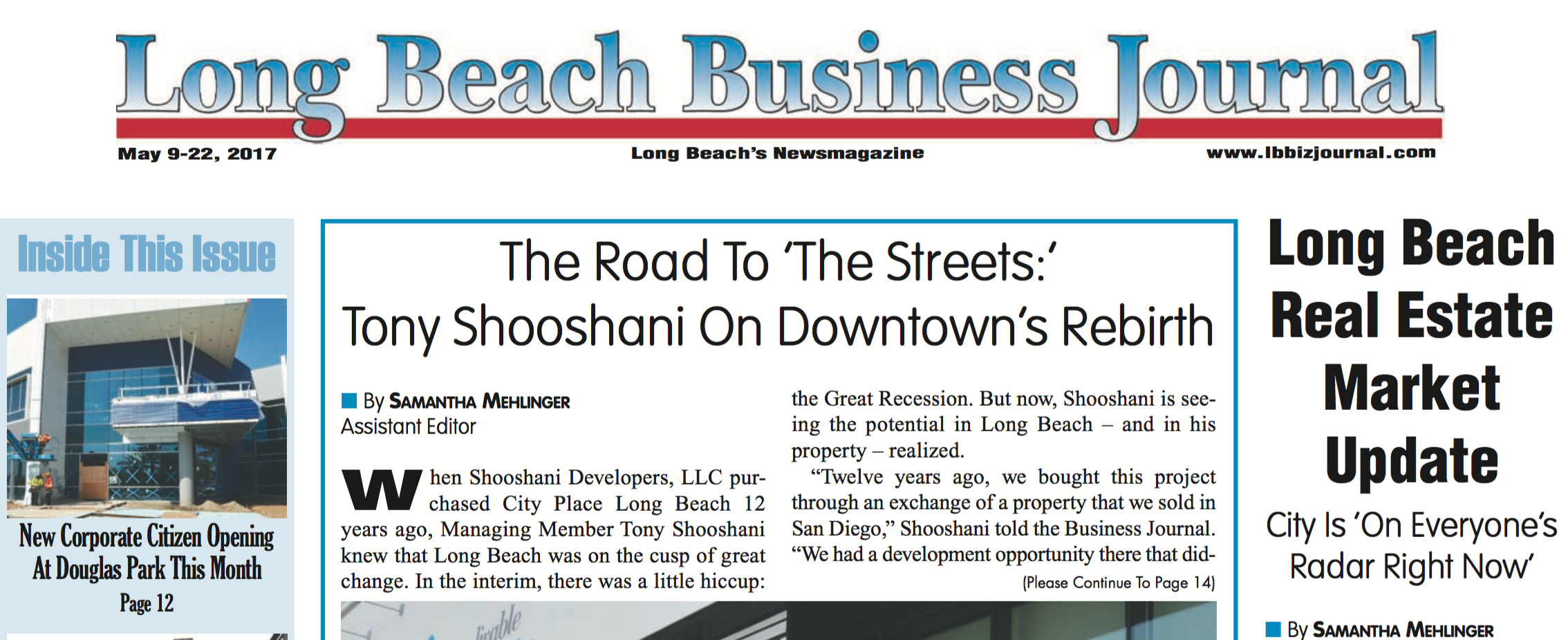Doug Shea and Eric Christopher quoted in Long Beach Business Journal
INCO’s own Doug Shea and Eric Christopher were both quoted in a recent article in the Long Beach Business Journal entitled The Road To ‘The Streets:’Tony Shooshani On Downtown’s Rebirth.
Eric Christopher, senior associate with INCO Commercial, said that increasing interest rates – and the anticipation that the Federal Reserve will raise rates two to three times this year – are creating a sense of urgency among both buyers and sellers. Buyers wish to take advantage of low interest rates to create the best return on their investment, and sellers recognize that window of opportunity
“I would say, if the first quarter was a little more flat, the second quarter is a little more bullish, as far as people out looking to open up new stores and open up new restaurants,” Doug Shea, president of INCO Commercial, said. “I’m getting a lot of calls on my retail products that are in good areas and some that are in just medium areas.”
You can read the entire article by Long Beach Business Journal May 2017.
The Language of 1031 Exchange
Language is a powerful thing — so much so that being well-versed in the parlance of a given field is absolutely necessary for success.
Think about it. Would you expect to have a coherent conversation with your surgeon about an upcoming procedure if you didn’t know the names of your body parts? Of course not! The same holds true for complex financial procedures such as the 1031 Exchange, where you will want to know the specific definitions of words and phrases. After all, it’s your money that’s on the line!
So here are some important definitions / descriptions related to the 1031 Exchange process; knowing these will enable you to avoid finding yourself at a linguistic disadvantage when it comes to performing one.
Definitions Related to the 1031 Exchange Process
1031 Exchange: A 1031 Exchange refers to the “swapping” of one investment, asset or business for another, with the majority involving real estate transactions. While in other instances this practice would be taxable as a sale (and you would pay it immediately), this provision allows investors to defer them — legally — instead. With this practice, the property you exchange for (i.e. the one you’re giving up) is relinquished prior to the acquisition of your new property.
Like-Kind Property: Your ability to perform a 1031 Exchange depends on whether or not what you’re exchanging for is of “like kind” in relation to what you’re giving up. Properties that have the same / similar nature and / or character (regardless of differences in grade or quality) generally meet this description. Remember though, as it regards to personal property, the definition of “like-kind” becomes much more restrictive.
Exchanger: The property owner who is seeking to defer his / her capital gain other income tax via utilizing an IRC 1031 Exchange.
Relinquished Property: The “old” property that is being divested or sold by the exchanger / investor.
Replacement Property: The “new” property that is being acquired or purchased by the exchanger / investor.
Qualified Intermediary: The person or entity that facilitates the exchange for the exchanger / investor. Similarly used terms include exchange facilitator and exchange accommodator. Note that to become a qualified intermediary, the exchange facilitator must meet the criteria spelled out in Treas. Reg. 1.1031(k)-1(g)(4)
Exchange Period: The period during which the exchanger / investor must acquire the replacement property in the exchange; it starts on the date the relinquished property is transferred and ends on the earlier of these: 180 days after this action or the exchanger’s tax return due date (including extensions) for the year of the relinquished property transfer.
Sources
https://www.ipx1031.com/wp-content/uploads/2013/11/IPX1031BriefExchanges.pdf
1031 Exchange Checklist
The 1031 Exchange is a versatile tool that helps real estate investors defer their capital gains tax. It also functions as a means for dumping under-performing assets (among other benefits).
So, it’s no surprise that you’re considering this convenient option. However, while in this exploratory phase, you need to make sure you’ll be qualified and prepare to initiate one when the time is right.
To this end, we compiled this list of questions you should be asking.
- Do I currently own real estate property?
The most commonly exchanged asset is real estate property. Some caveats are that properties can’t be an investor’s primary residence; a personal residence would not qualify for a 1031 Exchange. Property must be one that they currently own. Any property you’re exchanging — and exchanging for — must be for investment or business use. So, the first questions to ask are: 1. Do I currently own property? 2. Does that property meet this description?
- Is there a capital gains or recaptured depreciation tax?
The main reason for initiating a 1031 Exchange is to defer the taxes you will pay. As such, the next question you should ask is if there will be a capital gains or recaptured depreciation tax levied when selling your existing property. If not, the 1031 option makes little sense.
- Am I aware of other types of property that qualify for exchange?
Significantly, your ability to perform a 1031 Exchange isn’t limited to owning real estate property. In other words, many other types of holdings — again, so long as they are owned for “investment or business use” — qualify for an exchange. These include: land, various types of commercial property, vacation homes, ranch / farm land, and even aircraft.
- Am I aware of these two critical requirements?
As investors get closer to initiating a 1031 Exchange, there are two critical requirements they need to know. The first is the 180-day timeframe, which is when you must complete your 1031 Exchange transaction (including the conveyance or receipt of title to all of like-kind replacement properties) no later than:
(1) midnight of the 180th calendar day following the close of the relinquished property sale transaction – or –
(2) the due date of your Federal income tax return for the tax year in which the relinquished property was sold, including any extensions of time to file.
Furthermore, the property you are exchanging for must be of equal or greater value (debt and equity) than the property you’re selling.
- Do I know other reasons for 1031 Exchange?
Other reasons for performing a 1031 Exchange include: resetting an investor’s depreciation schedule, increasing their cash flow and enabling portfolio diversification.
Sources:
The 1031 Exchange “Like-Kind” Requirement
At Inco, we’ve aimed to enhance your 1031 Exchange acumen through a series of articles detailing the entire process. Through these efforts, we’ve brought our investor’s attention to key terms and timelines, including the history of this section in the tax code.
The reason behind our approach is simple: providing clients with a clearer understanding of investment options aids better decision making. After all, we are talking about your hard earned dollars — so why take unnecessary risks?
In the present installment, we underscore the importance of knowing another key concept, the “like-kind” requirement, because a thorough understanding of it can make all the difference.
What Property Qualifies for Like-Kind Exchange?
When considering a 1031 Exchange, it’s important that you first understand the “like-kind” qualification, which states that the property you’re exchanging for must be of the same nature, character or class of the property you’re selling. What this effectively means is that the two properties must also be of “equal or greater value” (debt and equity).
These requirements can be fulfilled (most simply) by performing a simultaneous swap of one property for another. Furthermore, both of the properties (i.e. the one you’re exchanging and exchanging for) must be held for use in a trade or business or for investment purposes.
What this means is that any property used primarily for personal use, such as an investor’s personal residence or second home / vacation home, would not qualify for like-kind exchange treatment.
Real vs. Personal Property
1031 Exchanges aren’t limited to real property; in fact, personal property can also qualify as an exchange property, under Section 1031 of the U.S. tax code.
Just remember that real property is never considered “like-kind” to personal property; in other words, you can’t exchange a car for a home. Moreover, when it comes to personal property exchanges, the rules pertaining to what qualifies as like-kind are more restrictive than the rules pertaining to real property. As a practical example, a car cannot be considered as a like-kind to a truck, and therefore, you can’t exchange the two.
Property Excluded From 1031 Treatment
In addition to understanding the types of property that qualify for like-kind exchange and the distinction between real and personal property, we recommend that our clients know the property types that are excluded from 1031 treatment.
Here’s a helpful list of assets / property types that cannot be applied to a 1031 Exchange:
- Inventory or stock in trade
- Stocks, bonds, or notes
- Other securities or debt
- Partnership interests
- Certificates of trust
What Comes Next?
We hope that this information has augmented your understanding of the 1031 Exchange’s like-kind requirement. If you have additional questions or would like to discuss the details further, give us a call today at (562) 296-1362.
Sources:
https://www.irs.gov/uac/like-kind-exchanges-under-irc-code-section-1031





